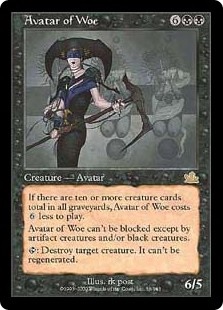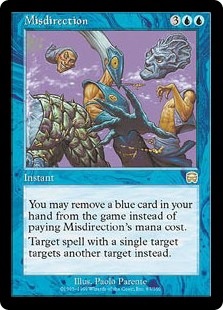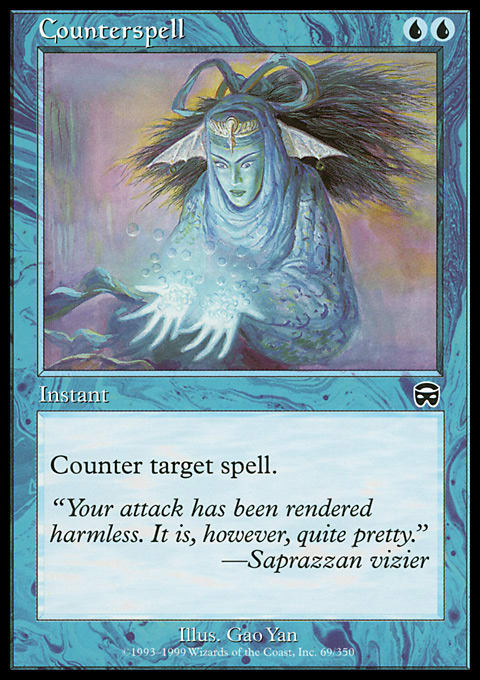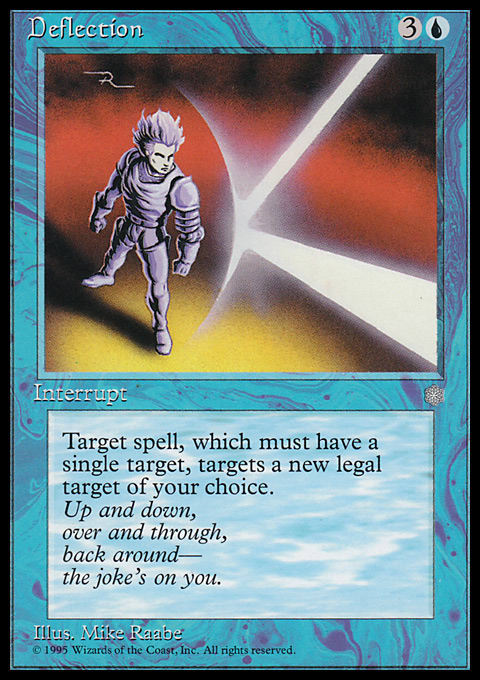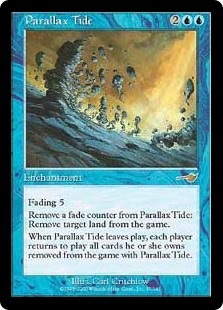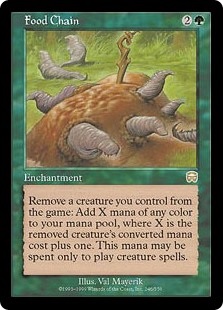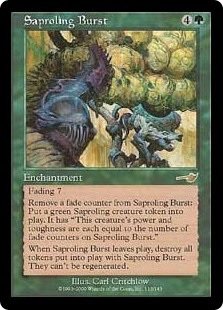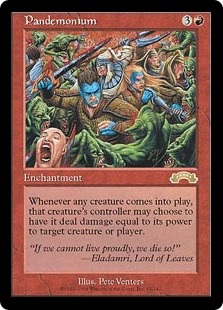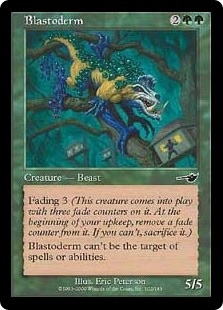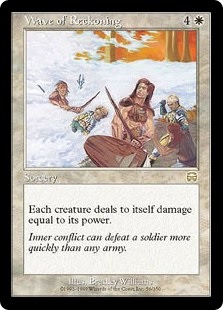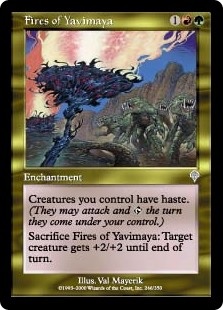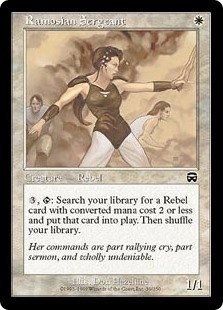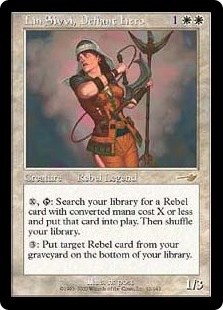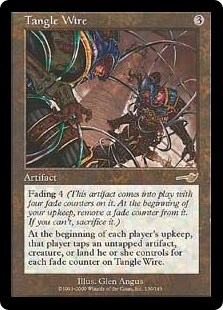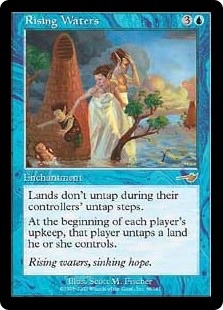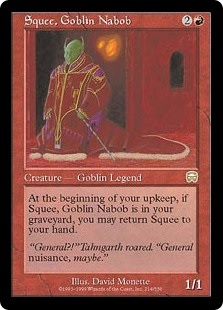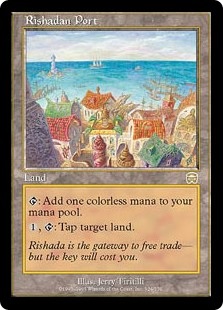Hello! Happy almost-December to you!
I've recently begun doing a series where I look back and examine the best cards from a given Block. I began with Mirage Block and moved forward. One of the goals of this series is to provide retrospectives for readers who may not have played during this era, as well as conversation pieces for those who did.
I played during this era, so I hope to provide valuable context.
The weird thing about Masques Block, in retrospect, is that this was clearly about slowing things down. The last two blocks printed an unparalleled amount of fast mana and cheap effects to force things into play for no mana at all.
We had fast mana like:
- Tolarian Academy
- Academy Ruins
- City of Traitors
- Mox Diamond
- Lotus Petal
- Grim Monolith
- Gaea's Cradle
- Metalworker
And many others.
And that joined cards like:
And many others that cheated something out for no mana.
Into this era walked Masques. Basically, this block was all about getting people to slow down. The path it walked was successful but did so with cards that weren't fun and performed the job similarly to the first generation of cards like Winter Orb, Armageddon, or Stasis. But it worked. This block slowed down a lot of problems, as you'll see below.
So today, let's lookat the cards that're the best from this trifecta of sets.
Honorable Mention - Avatar of Woe and Rhystic Study
Although Avatar of Woe dominated the kitchen table during its era and remains with a big ol' board presence even today due to its cheap and easy alternate cost in multiplayer, it was never a powerhouse for other formats. The art and card werekeenly felt, and the card was very popular, but never at the tournament tables. I consider it to be one of the most iconic casual cards of all time, however, so here's an Honorable Mention Shout Out.
Pretty much everything I said for Avatar is true of Study, but with weaker enthusiasm.
10. Gush // Land Grant
Both of these alternate cost cards enabled entire strategies of decks. For example, take the latter that would run just a handful of dual land Forests and Land Grant to fetch it. A deck might have just four Taigas, but a first turn Land Grant into Taiga for a 2/3 Kird Ape is impressive. Especially with other powerful one-drops like Rancor, Rogue Elephant, Lightning Bolt and more. Quirion Ranger could bounce the land after you tapped it to cast someone for another go. It was very synergetic in many places as a free variant on Rampant Growth that puts the land in the hand. Land Grant was always going to have value.
For similar reasons, take Gush, which was a powerhouse in decks like Turbo Stasis, and was iconic in Vintage it's been restricted three times. Free two cards are always going to be an issue. In Stasis, it let you reset two Islands so you could play and upkeep your Stasis for at least a couple more turns. You could bounce Islands so you could pitch them for alternate costs like Foil.
Although they were not on the level of Force of Will or even Fireblast, free cards like these or the untap lands ones of the previous Block will always warp environments. This was clearly not a lesson that Wizards learned, as you can witness with free Phyrexian Mana cards a generation later. We have free counters like Foil and Thwart. We have free creatures that were heavily played such as Vine Dryad.
They weren't Forces, but they still made an impact on the game...
But we had one card that came very, very close to Force-ness...
9. Misdirection
Another fetch card, but this time it's much more powerful than the previous folks. The ability to discard It's the closest card on the level of Force you are going to find. The ability to redirect a spell to a new source is pretty nifty. However, it's also priced very well.
Here let me show you:
This is Counterspell compared to Force of Will. Notice that Force is a full three mana more than Counterspell. You are paying a three-mana tax for the effect to give you the Free Spell discard effect. That's a nasty tax if you want to hard cast it.
But compare that to Deflection, which is the base card for Misdirection. Misdirection is just one mana more, so you aren't really losing any major tempo or effects by running Misdirection over Deflection, like you are with Counter vs Force.
Note that the free ability has pushed Misdirection into builds in formats like Standard or Vintage, and it has a place today at the kitchen tables and Commander as well as tournament tables too (like Legacy)!
8. Parallax Tide // Parallax Wave
Another example of the tempo of this era are the Tide and Nexus here, as they will pull your stuff away for a bit before punching you hard in the gut. The Tide was part of a quick combo kill along with Ankh of Mishra. Each time a land comes into play under its controller, they take two damage. You drop Ankh, and then Tide five lands that come back smash them for ten damage. Your foe likely already took some damage from the Ankh (it's a 2-drop) and will be easily killed with another Ankh or another Tide or without the ability to drop more lands. Game over.
Meanwhile the Wave was a strong bit of tempo as you dropped it and then send some dorks away. For example, on Turn 4, you could cast it, exile three opposing dorks and swing with your critters. Then remove a fade counter and do it again. Then repeat and do it another time, and it's basically a double Sleep effect as you get three attacks out of it instead of two. Or you could exile more dorks for a smaller amount of time. Both were played a lot and had strong tournament pedigrees during this era.
7. Food Chain
Speaking of "strong tournament pedigrees," this is Food Chain. Now Food Chain took some time to catch on, but wow did it ever do precisely that. Decks like Food Chain Goblins were strong efforts that will push folks around. Food Chain feels more like an unfair mana making card from the previous Blocks than a Masques Block card. If I am getting a creature into play for free, such as Show and Tell, Goblin Lackey, or Sneak Attack, then this can take that quick cost and turn it into a nasty amount of mana. Despite the weakness of Food Chain only working to churn out creatures, it's a broken montage of mana making madness.
6. Saproling Burst
Saproling Burst was an engine that made a lot of Standard legal decks work and it was heavily respected for that reason.
Pandemonium is a good example of such a combo.
- Pull off one counter. Deal 6 damage to someone's face.
- Pull off one counter. Deal 5 damage to someone's face.
- Pull off one counter. Deal 4 damage to someone's face.
- Pull off one counter. Deal 3 damage to someone's face.
- Pull off one counter. Deal 2 damage to someone's face.
- Pull off one counter. Deal 1 damage to someone's face.
Congrats, you have just dealt 21 damage to someone's face. I think you may just have won the game.
And while that's nice and all, that isn't anything compared to how dominant this card made the most prolific Standard deck in the era. See below for more details. Without the Burst, that combo just doesn't have the same reach.
Check it out...
5. Blastoderm
Blastoderm was a game-winning powerhouse that pushed Green into a strong position. The fact that it had shroud meant that your foe had a rough time dealing with it. Did it resolve? Great, it's going to smash you in the face for 15 damage unless you can block it or deal with it in battle. (It could be killed by the commonly played Wrath in this era Wave of Reckoning.) It was printed in an era with a lot of mana accelerants, so It was a shoe-in for the third turn. It was a beatstick that ended games.
Like #6 above, it also enabled the Standard Fires of Yavimaya deck to kill quickly.
Imagine this game:
- Turn 1, you cast either Birds of Paradise or Llanowar Elves. Good job.
- Turn 2, you cast Fires of Yavimaya off your three mana
- Turn 3, you cast Blastoderm and swing for 5 shrouded and hasted damage.
- Turn 4, you cast Saproling Burst and swing for 12 more damage hasted, in addition to your 5 damage Blastoderm which will still be standing.
Game! Who could survive?
Blastoderm was no joke. It was played heavily and was so iconic that it was planeshifted as Calciderm in Planar Chaos.
But it's not one of my top four cards!
4. Ramosian Sergeant // Lin Sivvi, Defiant Hero
In an era of decks throwing up many a road block for you, Rebels was a perfect counter-strategy. For this reason, Ramosian Sergeant was the single best 1-drop of the era! If you led with it and dropped it under a Counter shield or tempo-laden trick, then you could just tap three mana and it to fetch out any 2-drop. Note the Rebels featured an ability where they searched up the casting cost chain, so you could tap the Sergeant for a 2-drop, 2-drops could search for three drops, and such. But the ability cost one more mana. (On the other hand, Mercenaries searched down the casting cost chain, but did so for that precise cost so you never wasted mana.) There were many a great Rebel in this era you could fetch up, and a single Sergeant could win the game by herself if unanswered. Your ideal target was to fetch up Lin-Sivvi with your 2-drop that the Sergeant could grab you, and then win. Tap and grab anything from your deck into play that works! Are you playing against Red or Black? No worries, I have protection from those colors at my 3-drop. I have flyers and blockers, and I have crazy options as well. It's a deep tribe with a lot of synergy, and Rebels were the iconic tribe of the era. While the Sergeant was never touched by the banhammer, Lin-Sivvi was banned in her Block. So sad!
3. Tangle Wirewith a Shout Out to Rising Waters
Tangle Wire was essentially the Winter Orb or Stasis of the era, (save for the actual Rising Waters.) Because of that, it was heavily played. For example, imagine you are any aggro deck:
On turn 3, you have 3 lands, and 2 dorks. You cast this and swing with anything that'll make it through. You pass.
Your foe untaps and taps four permanents, which are likely all or most of their lands and creatures played.
You take your turn 4 and untap. You pull a fading counter off and now just need to tap 3 things. Tap Tangle Wire. Tap two things like 2 lands. Play a land. Swing with your stuff for 4-5 damage. Cast a two-drop. Pass.
Your foe taps three permanents, which are likely three lands and leave any creatures they cast out. They drop a land. See how far behind they are? You will always be two permanents ahead of them because you tap the Tangle Wire at the same time as you pulled off a fading counter. The result is a huge tempo swing for you over multiple turns that can easily lead to wins. For this reason, it was heavily played while it was legal!
There were also a ton of Waters decks during the era too. It's another bulky way of forcing folks to slow down.
2. Squee, Goblin Nabob
Squee is the perfect intersection of flavor and usefulness. In the story line, he gained virtual immorality from a magical item. When Squee died, he came back. How do you illustrate that on a card? This is perfect! You can return Squee from your graveyard to your hand for free each upkeep. No mana or anything else needed. It was a perfect fit, and Squee made the cut in many deck, such as the Standard Recurring Nightmare + Survival of the Fittest decks where you'd go for him first with the Survival so you could recur him again later on and would continue ad nauseum.
1. Rishadan Port
It was so good it was banned in Block, and this is the last Block with banned cards until Mirrodin Block. This Port was the most iconic example of how Masques Block wanted to force everyone to slow down. The Rishadan Port has remained a powerhouse in various formats and is worth a ton of money as a result. The ability to easily tap a land is great at slowing folks down by doing it in their upkeep before they untap, or twinned with land destruction and other tempo effects, or to lock out a color, or to tap a land that really needs to be shut down, such as Maze of Ith. The versatility of Port is something you shouldn't sleep on. Ever.
And there we go! Thanks for reading my list? Anything I missed? Anything you'd want to add?
Appendix of Top Ten Block Lists:
Did you enjoy our throwback list of the best cards of yore? Did you want to keep going back and check out some more fun times? Excellent! Check these out as well!
















